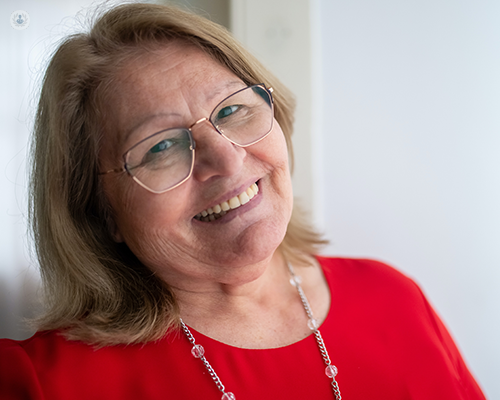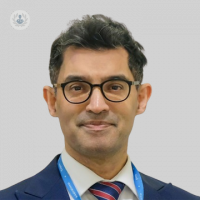The eyePlate device: A groundbreaking solution for advanced glaucoma
Written in association with:Glaucoma is a leading cause of irreversible blindness, affecting over 700,000 people in the UK and 80 million globally. For those with advanced or aggressive forms of the disease, treatment options have often been limited, particularly when conventional therapies have proven insufficient. However, a pioneering device, the eyePlate, is changing the landscape of glaucoma treatment and providing new hope for patients with difficult-to-manage eye pressure.

What is the eyePlate device?
The eyePlate device is an innovative treatment specifically designed for patients with advanced or aggressive glaucoma, particularly when eye pressure remains uncontrolled despite traditional treatment approaches, including surgery. This device represents a crucial breakthrough, offering a new approach for cases where other methods have failed to effectively reduce intraocular pressure.
Mr Faisal Ahmed, a consultant ophthalmologic surgeon, has been at the forefront of introducing the eyePlate in the UK, pioneering its use in his clinical practice at The London Clinic. His work has showcased the potential of the device to improve patient outcomes significantly, offering those with complex glaucoma a chance for better disease management.
How does the eyePlate benefit glaucoma patients?
A recently published scientific study led by Mr Ahmed has demonstrated promising results with the eyePlate. The study, available in the Journal of Clinical Medicine, found that the device was highly effective at reducing eye pressure among patients with advanced glaucoma and who had previously undergone glaucoma procedures that failed or other complicated eye surgery. Even in this high risk group of patients the success rate was 83 per cent, with nearly half of those treated with the eyePlate able to discontinue glaucoma eye drops and remain eye drop-free. This reduction in eye pressure and dependency on eye drops represents a significant improvement in quality of life for many patients, particularly those with complex medication regimens.
In addition Mr Ahmed has developed a new surgical keyhole technique to implant the eyePlate and similar glaucoma drainage devices, which reduces surgical time and recovery time and has been presented nationally and internationally and published in a scientific journal.
The eyePlate works by providing a steady, controlled reduction in intraocular pressure, which is essential in preventing further damage to the optic nerve and preserving remaining vision. In comparison to traditional surgical treatments, it offers a more targeted and sustainable approach for those with challenging cases of glaucoma.
Why is the eyePlate significant for glaucoma treatment?
The eyePlate offers hope for patients who previously had limited options. Advanced glaucoma is notoriously difficult to manage, and high eye pressure can lead to irreversible optic nerve damage and vision loss. For patients whose glaucoma progresses despite standard treatments, the eyePlate’s ability to effectively manage intraocular pressure is vital.
Moreover, the eyePlate device is not only effective but has shown to be safe for use, making it an invaluable option for patients with aggressive glaucoma. With over 40 per cent of patients becoming eye drop-free (for at least one year), it is clear that this innovation has the potential to transform how glaucoma is treated, offering a more sustainable, long-term solution for those most at risk of vision loss.
Availability of the eyePlate device
The eyePlate is currently being used in select clinics, with Mr Ahmed leading its implementation at The London Clinic. His expertise in ophthalmology and dedication to advancing treatment options for glaucoma patients make him a key figure in this groundbreaking development. As more data emerges on the eyePlate's effectiveness, it is likely that its availability will expand, providing more patients access to this potentially life-changing device.
Looking ahead: The future of glaucoma management
The introduction of the eyePlate device marks an exciting step forward in glaucoma treatment. For patients with limited options, this device offers not only a way to control eye pressure but also the possibility of reducing or even eliminating the need for daily eye drops. By targeting the root cause of optic nerve damage – high intraocular pressure – the eyePlate offers a new pathway to better outcomes for those affected by this challenging condition.


